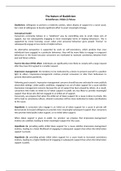The Nature of Slacktivis
Kristofferson, White & Pelozaf
Slacktivis: willingness to perform a relatiell costless, token displal of support for a social cause,
but a lack of willingness to deiote significant efort to enact meaningful change.
Conceptual sodel
Consumers commonll behaie in a “slacktiistt wal bl commitng onll to small, token acts of
support, but not subsequentll engaging in more meaningful forms of helping behaiiours. This is
supported bl moral licensing: occurs when prior prosocial behaiiour giies people “licenset to
subsequentll engage in less moral or helpful actons.
An alternatie perspectie is supported bl work on self-consistencl, which predicts that once
indiiiduals haie engaged in a partcular behaiiour, thel will be more likell to engage in congruent
behaiiours in the future because consumers are motiated to maintain consistencl between their
past and future actons.
Foot-vn-the-door (FITD) efect: indiiiduals are significantll more likell to compll with a large request
afer thel haie first agreed to a smaller request.
Ispreiivon sanagesent: the tendencl to be motiated bl a desire to present lourself in a positie
light to others. Impression-management moties prompt consumers to alter their behaiiours to
present themselies positiell.
Following past research, impression management concerns should become actiated in more publicll
obseriable setngs. Under public conditons, engaging in an act of token support for a cause satsfies
impression management concerns because the act of support has been iiewed bl others. As a result,
consumers who make an inital act of token support in public are less likell to proiide meaningful
support than those who did not engaged in an inital act of support.
Coniersell, we propose that when the inital act of token support for a cause is done in priiate, this
will to lead to consistencl efects, wherein consumers will be more motiated to make contributons
to the cause.
Hypotheivi 1: consumers who engage in an inital act of token support for a cause in priiate will
demonstrate increased willingness to proiide more meaningful subsequent support than consumers
who proiide inital public token support, or no inital token support.
When token support is giien in public (is. priiate), we propose that impression-management
moties are satsfied, leading to lower meaningful support for the cause.
Hypotheivi 2a: proiiding public inital token support for a cause satsfies impression-management
moties, leading to a lower likelihood of engaging in subsequent support than when the inital token
support is priiate.
Hypotheivi 2b: proiiding priiate inital token support for a cause leads to increased consistencl
moties, leading to a higher likelihood of engaging in subsequent support than when the inital token
support is public.
, Study 1
Method
Partcipants were randomll assigned to either the priiate token support, public token support, or no
token support conditon. In the public token-support conditon, partcipants were asked whether
thel would accept a free poppl to wear right now to show support for Remembrance Dal. In the
priiate token-support conditon, partcipants were asked whether thel would accept a free poppl to
take with them to show lour support for Remembrance Dal. A research assistant asked partcipants
monetarl donatons on behalf of war ieterans.
Results
Partcipants in the priiate token-support
conditon donated significantll more
monel than partcipants in the other two
conditons;
There was no significant diference
between the donatons in the other two
conditons.
Study 2
Method
We created marketng materials to represent two charitable organizatons. In the token-support
conditons, partcipants were told that thel could help one of the causes bl signing one of the two
pettons. In the no-token-support conditons, partcipants were told that in order to ensure proper
credit for partcipaton, thel should sign their name on one of the two atendance sheets. In the
public conditons, partcipants walked to the front of the room and signed either one of the two
organizaton pettons or one of two atendance sheets. In the priiate conditons, partcipants signed
at their indiiidual computer. Partcipants were told that help was required to stuf enielopes for this
campaign. The amount of tme partcipants were willing to iolunteer seried as the dependent
iariable.
Results
Afer an inital act of token support,
partcipants were significantll more willing to
iolunteer when the context was priiate;
No diferences emerged in the support-absent
conditons.
Study 3
Method
Partcipants were randomll assigned to either the public token support, priiate token support or no
support conditon. Before partcipants examined the marketng materials or engaged in an act of
token support, thel were asked to answer six questons regarding impression-management moties.
Partcipants then receiied the same charitable organizaton instructons, materials and token-
support manipulaton used in studl 2. Upon proiiding token support, partcipants were instructed to
answer the same six queston regarding impression management as at the beginning of the studl to
measure consistencl. Afer a while, partcipants were asked if thel would be willing to help bl
stuffing enielopes for 60 minutes for a mail campaign.




